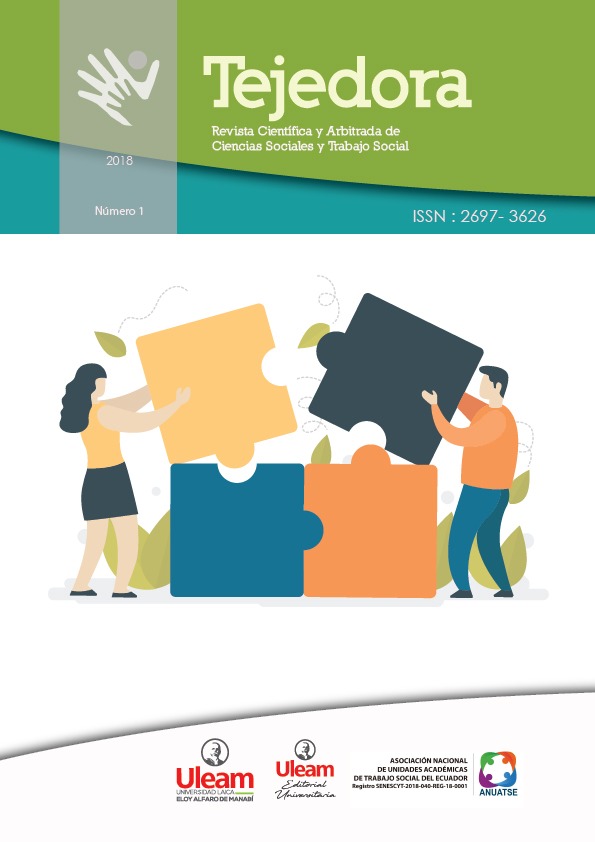DESAPARECIMENTOS NO EQUADOR ALÉM DAS ESTATÍSTICAS, FAMÍLIAS RESILIENTES, INAÇÃO DO ESTADO
DOI:
https://doi.org/10.56124/tj.v7i13.011Palavras-chave:
Desapariciones, Familia, Derechos Humanos, Estado, InvisibilizaciónResumo
O objetivo desta pesquisa é analisar a situação social, familiar e jurídica vivenciada por familiares de pessoas desaparecidas durante os processos de busca. A população alvo foram os familiares de pessoas desaparecidas da Associação de Familiares e Amigos de Pessoas Desaparecidas do Equador (ASFADEC), que se concentra em exigir verdade, justiça e memória em casos de pessoas desaparecidas e outras que foram encontradas mortas. Este trabalho analisa os processos e histórias de vida de famílias de pessoas desaparecidas em conjunto com a ASFADEC; Foi utilizada uma metodologia mista qualitativa e quantitativa para a pesquisa. Num primeiro momento foi aplicado um questionário em escala Likert, sobre as diversas situações que os familiares enfrentam diariamente; num segundo momento foram elaboradas cinco (5) histórias de vida para conhecer as experiências familiares e o caminho percorrido durante a busca. A abordagem teórico-conceitual do estudo foi realizada por meio de três (3) categorias que buscam analisar a situação social, familiar, jurídica e a invisibilidade dessa problemática. Dos principais resultados encontrados, podemos concluir que 70,6% dos familiares de pessoas desaparecidas não conseguiram retomar suas atividades diárias após o desaparecimento de seu familiar, o que se soma aos 47,1% das entrevistas que indicam que há um baixo nível de conscientização na sociedade equatoriana sobre o problema dos desaparecimentos.
Downloads
Referências
Arcila, P., Mendoza, Y., Jaramillo, J., & Cañón, O. (2010). Comprensión del significado desde Vygotsky, Bruner y Gergen. Diversitas: Perspectivas en Psicología, 6(1), 37
Código Orgánico Integral Penal. [COIP]. Ley 180 de 2014. 10 de febrero de 2014 (Ecuador). https://www.asambleanacional.gob.ec/es/system/files/document.pdf
Ley 130 de 2020. (2020, 28 de enero). Asamblea Nacional. Registro Oficial N° 130.https://servicios.inclusion.gob.ec/Lotaip_Mies/phocadownload/01_ene_2020/literal_a2_base_legal/Registros%20Oficiales/RO%20S%20No.%20130%20(28-ENERO- 2020).pdf
Corte Interamericana de Derechos Humanos. (s.f.). Escrito de solicitudes argumentos y pruebas que presenta el Dr. Cesar Duque, asesor jurídico de la Comisión
Ecuménica de Derechos Humanos (CEDHU) como representante legal de las víctimas.https://www.corteidh.or.cr/docs/casos/herrera_espinoza_ec/esap.pdf
Dewhirst, P. y Kapur, A.(s/f). Centro Internacional para la Justicia Transicional. Ictj.org. Recuperado el 21 de junio de 2023, de https://www.ictj.org/sites/default/files/ICTJ- Global-Desapariciones-Genero-2015-ES.pdf
Fernández Velázquez, J. A., & Ramírez Valenzuela, E. (2020). De la violencia social a la violencia institucionalizada. Aproximaciones teóricas para entender el problema de la desaparición forzada. En Conjeturas sociologicas (Vol. 20, p. 197-208).https://revistas.ues.edu.sv/index.php/conjsociologicas/article/view/1615
López, Dayan. (2017). De la naturalización de la violencia a la banalidad del mal. Ratio Juris. 12. 111-126. 10.24142/raju.v12n24a5.
Puelles M (2018), Afrontamiento Resiliente De La Desaparición De Un Ser Querido, Psicopatología Clínica, Legal y Forense, Vol. 18, 2018, p. 151-175. ISSN: 1576-9941
Rojas, Paz (2009). La interminable ausencia. Santiago: LOM ediciones.
Salazar, K.; Mendoza, L. & Raesfeld, L. (2020). Violencia, victimización y percepciones de inseguridad sobre las familias del México contemporáneo. Boletín Americanista, 81, p. 201-227. https://doi:10.1344/BA2020.81.1009
Publicado
Como Citar
Edição
Seção
Licença
Copyright (c) 2024 Revista Científica y Arbitrada de Ciencias Sociales y Trabajo Social: Tejedora. ISSN: 2697-3626

Este trabalho está licenciado sob uma licença Creative Commons Attribution-NonCommercial-ShareAlike 4.0 International License.






















